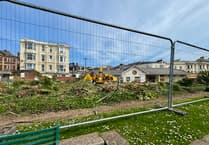DEVON’S forthcoming devolution, which supporters maintain will transform sections of the county’s economy, won’t be such a good deal for its districts.
That’s the claim made by one senior local politician in the same week another local leader warned the deal would see ‘the Torbay tail wagging the Devon dog’.
The devolution debate is in full swing after the agreement was formally endorsed with a ministerial visit.
Levelling Up minister Jacob Young hailed it as a great step forward, saying it would deliver more power to the people and would unlock tens of millions of pounds in government investment.
It means Torbay and Devon councils will join to form one Combined County Authority, with devolved powers over transport and adult education policies and a war chest of capital investment to spend.
The new authority will not have an elected mayor, and the leaders of Torbay and Devon have stressed that both authorities will keep their unique identities and there will be no changes of name.
A public consultation on the proposals is due to begin later this month, but some district councillors are already airing misgivings.
The latest local politician to have his say was Teignbridge Council deputy leader Richard Keeling (Lib Dem, Chudleigh).
He told an overview and scrutiny meeting: ‘It is not a good deal for district councils.
‘It will see more money going into Devon, which is the big gulper of money.
‘I don’t think this will be good for the district councils of Devon from what I have seen so far.
‘Financially we will not benefit at all.’
Plymouth City Council pulled out of the deal altogether, claiming it would retain more power by staying independent.
Cllr Frank Biederman (Ind, Fremington Rural) told a recent Devon County Council meeting the CCA scheme is a ‘desperate measure by a desperate government’.
And South Hams Council leader Julian Brazil (Lib Dem, Kingsbridge) told the same meeting it was a case of the ‘Torbay tail wagging the Devon dog’.
He said: ‘Torbay has about one-sixth of Devon’s more than £800,000 population.
‘They need support more than we do.’





Comments
This article has no comments yet. Be the first to leave a comment.